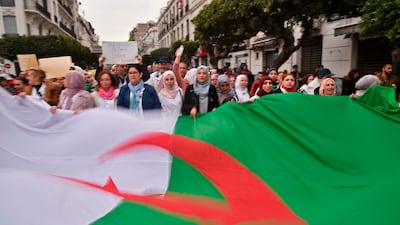Algeria's ruling National Liberation Party (FLN) on Wednesday said it supported widespread demands for the country's ailing president to step down, in the heaviest blows for the veteran leader since the unrest began.
The comments underscored the growing rift between the country's ruling powers as more parties, officials and unions voice their support for the protesters.
"FLN fully supports the popular protest movement," the APS state news agency quoted the party leader Moad Bouchared as saying. Mr Bouchareb urged Algerians to "stand united, alert and mobilised during this sensitive phase in the history of our country".
Algeria's army chief on Tuesday said the public had expressed "noble aims" during protests against President Bouteflika.
Lieutenant General Ahmed Gaed Salah said that a month of demonstrations had been "marked by the deeds of noble aims and pure intentions, through which the Algerian people has clearly expressed its values and principles of sincere and dedicated work to Allah and the motherland".
President Abdelaziz Bouteflika, 82, abandoned his bid for a fifth term in office and said last week he would stay to lead the country through its transition. But demonstrations have continued unabated.
The 82-year-old president said he will hand over power to a democratically elected successor after a new constitution is approved and a national conference is held, Deputy Prime Minister Ramtane Lamamra said on Wednesday.
"The plan to get out of this situation, the plan which President Bouteflika presented on March 11, states that the president is committed not to run in any new election and that the collective, independent national conference is the one to fix the date of this election," he told a news conference in Berlin.
"Once this national conference happens...and a new constitution is in place...a presidential election will be held and by then the term of President Bouteflika will expire and the presidency will be handed over to the person elected by the Algerian people," Mr Lamamra said.
But the compromise was quickly rejected by the protesters, who saw it as an attempt by the president to sap their momentum and move ahead with his plan for an abridged term without holding elections.
The country’s newly-appointed deputy prime minister, Ramatane Lamamra, said on Wednesday that officials hoped the transition of power could take place “without confrontation,” Echourouk TV reported.
Mr Lamamra, who was dispatched to meet with foreign officials, including in Russia and Germany, said he hoped Algerians would abandon protests in favour of a search for consensus, and that the solutions to the current crisis lay in the plan outlined by Mr Bouteflika.
Developments in the North African country are being watched closely in Europe and elsewhere: Algeria is not only Africa’s largest energy producer but has been a bulwark against violent militancy and migration from other parts of the continent across the Mediterranean.

